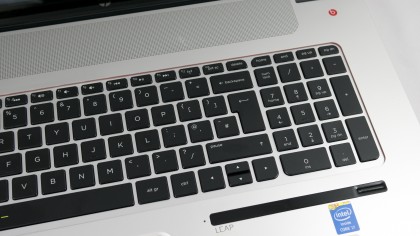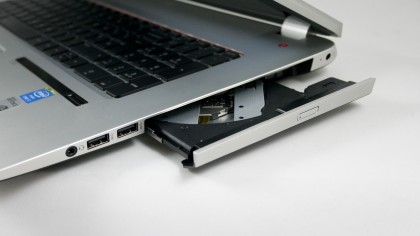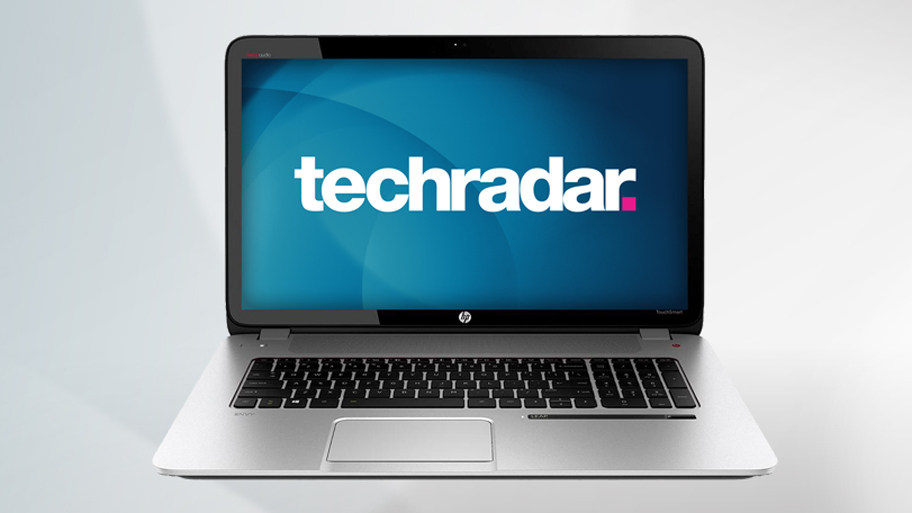Why you can trust TechRadar
While there's a small whiff of the kitchen sink about the spec list on the HP Envy Leap Motion, it makes for fairly impressive reading.
Obviously, you've got the Leap Motion controller itself. This black strip on the right-hand side of the unit houses the infrared LEDs and IR cameras that build up 3D images of your hand as it waves over the keyboard.
The technology shares some similarities with what Microsoft does with the Kinect camera in the Xbox One, though it's largely more simple, and obviously operates at a much smaller scale.
The rest of the computer is less unusual, though, if still packed. For a start, you've got a quad-core Intel Core i7-4207MQ processor. Unpacking that string of near-meaningless digits reveals that this is a fairly high-end chip, though by no means Intel's most advanced.
There are four cores, running at 2.2GHz, with cores able to reach 3.2GHz using Intel's Turbo Boost feature. It features HyperThreading as well, meaning that it can run as eight virtual cores, improving performance in intensive multi-threaded operations.

The chip is from Intel's newest fourth-generation Core range, known as Haswell, which is designed to bring major battery life improvements over previous chips, though as you'll see on the next page, its effect here is minimal in this regard.
There are integrated Intel graphics with the processor, in the form of Intel's HD 4600 GPU – this is fairly low end, but can be used in light operation on the laptop to keep battery usage lower.
For when you really need graphical grunt, there's a dedicated Nvidia GeForce 750M GPU with 4GB of VRAM. The video RAM used here is GDDR3 instead of GDDR5, though, meaning that its bandwidth isn't as high. This, and other factors, means that while it's certainly a good performer, it isn't super high-end. The 770M in the Medion Erazer X7825 and Schenker XMG P703 will beat it for performance, and if you were to get the latter configured with the 780M, you'd be in the realm of a full-on gaming laptop.
However, though larger, heavier gaming machines might be able to pack in more power, we still expect the HP Envy Leap Motion do pretty well for itself with these components – especially combined with 12GB of RAM.
It's a very generous amount, and is more than most people will probably need – not that we're complaining about its inclusion.
The 1TB hard drive is purely old-fashioned spinning disk storage, with no SSD for booting, which can mean slower startup times. This has the potential to hold the machine back for high-performance word, but ultimately, there's a choice between size and speed. That said, for £1,200, we'd hope for a bit of both.
The screen is a vast 17.2-inch 1080p affair, while Beats Audio speakers provide the sound from a grille that spans not far off the entire width of the machine.
For connectivity, you've got four USB 3.0 ports, which is better than most laptops offer at the moment, with HDMI, an Ethernet port, an SD card reader and a headphone jack rounding things out.

With more and more manufacturers choosing to go thin and light, optical drives are becoming less common, but HP has included a Blu-ray/DVD drive here, meaning that you can watch highest-quality HD films on that Full HD screen.
There's even a fingerprint scanner, since they're all the rage these days – especially since they've found their way onto the iPhone 5s, and HTC One MAX. Here, it's the classic little strip reader, though it's built into the black of the Leap Motion sensor, so is easy to miss.
